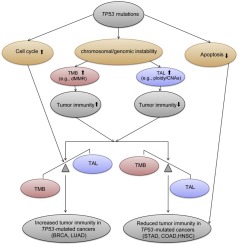当前位置:
X-MOL 学术
›
DNA Repair
›
论文详情
Our official English website, www.x-mol.net, welcomes your feedback! (Note: you will need to create a separate account there.)
Cancer type-dependent correlations between TP53 mutations and antitumor immunity.
DNA Repair ( IF 3.8 ) Pub Date : 2020-01-24 , DOI: 10.1016/j.dnarep.2020.102785 Lin Li 1 , Mengyuan Li 1 , Xiaosheng Wang 1
DNA Repair ( IF 3.8 ) Pub Date : 2020-01-24 , DOI: 10.1016/j.dnarep.2020.102785 Lin Li 1 , Mengyuan Li 1 , Xiaosheng Wang 1
Affiliation

|
Many studies have shown that TP53 mutations play a negative role in antitumor immunity. However, a few studies reported that TP53 mutations could promote antitumor immunity. To explain these contradictory findings, we analyzed five cancer cohorts from The Cancer Genome Atlas (TCGA) project. We found that TP53-mutated cancers had significantly higher levels of antitumor immune signatures than TP53-wildtype cancers in breast invasive carcinoma (BRCA) and lung adenocarcinoma (LUAD). In contrast, TP53-mutated cancers had significantly lower antitumor immune signature levels than TP53-wildtype cancers in stomach adenocarcinoma (STAD), colon adenocarcinoma (COAD), and head and neck squamous cell carcinoma (HNSC). Moreover, TP53-mutated cancers were more likely to have a higher tumor mutation burden (TMB) and tumor aneuploidy level (TAL) than TP53-wildtype cancers. However, the TMB differences were more marked between TP53-mutated and TP53-wildtype cancers than the TAL differences in BRCA and LUAD, and the TAL differences were more significant in STAD and COAD. Furthermore, we showed that TMB and TAL had a positive and a negative correlation with antitumor immunity and that TMB affected antitumor immunity more than TAL did in BRCA and LUAD while TAL affected antitumor immunity more strongly than TMB in STAD and HNSC. These findings indicate that the distinct correlations between TP53 mutations and antitumor immunity in different cancer types are a consequence of the joint effect of the altered TMB and TAL caused by TP53 mutations on tumor immunity. In addition, the deregulation of p53-mediated pathways, including cell cycle and apoptosis, may also contribute to the different correlations of TP53 mutations with antitumor immunity between different cancer cohorts. Furthermore, we demonstrated the different correlations of TP53 mutations with the response to immune checkpoint inhibitors between different cancer cohorts, suggesting that the TP53 mutation status could be a useful biomarker for predicting the response to cancer immunotherapy in different cancer types.
中文翻译:

TP53突变与抗肿瘤免疫力之间的癌症类型相关性。
许多研究表明,TP53突变在抗肿瘤免疫中起着负面作用。但是,一些研究报告说TP53突变可以促进抗肿瘤免疫。为了解释这些矛盾的发现,我们分析了癌症基因组图谱(TCGA)项目的五个癌症队列。我们发现,在乳腺浸润癌(BRCA)和肺腺癌(LUAD)中,TP53突变的癌症比TP53野生型癌症具有更高的抗肿瘤免疫标记水平。相比之下,在胃腺癌(STAD),结肠腺癌(COAD)和头颈部鳞状细胞癌(HNSC)中,TP53突变的癌症的抗肿瘤免疫标记水平明显低于TP53野生型癌症。此外,与TP53野生型癌症相比,TP53突变的癌症更有可能具有更高的肿瘤突变负担(TMB)和肿瘤非整倍性水平(TAL)。但是,在TP53突变和TP53野生型癌症之间,TMB差异比BRCA和LUAD中的TAL差异更明显,而在STAD和COAD中,TAL差异更显着。此外,我们显示,TMB和TAL与抗肿瘤免疫力呈正相关和负相关,并且在BRCA和LUAD中,TMB对抗肿瘤免疫的影响比TAL更强,而在STAD和HNSC中,TAL对TUM和抗肿瘤免疫的影响强于TMB。这些发现表明,在不同类型的癌症中,TP53突变与抗肿瘤免疫之间的独特相关性是由TP53突变引起的TMB和TAL改变对肿瘤免疫的联合作用的结果。此外,p53介导的通路(包括细胞周期和凋亡)的失控也可能导致TP53突变与不同癌症人群之间抗肿瘤免疫力的不同相关性。此外,我们证明了不同癌症人群之间TP53突变与对免疫检查点抑制剂反应的不同相关性,表明TP53突变状态可能是预测不同癌症类型对癌症免疫疗法反应的有用生物标记。
更新日期:2020-01-24
中文翻译:

TP53突变与抗肿瘤免疫力之间的癌症类型相关性。
许多研究表明,TP53突变在抗肿瘤免疫中起着负面作用。但是,一些研究报告说TP53突变可以促进抗肿瘤免疫。为了解释这些矛盾的发现,我们分析了癌症基因组图谱(TCGA)项目的五个癌症队列。我们发现,在乳腺浸润癌(BRCA)和肺腺癌(LUAD)中,TP53突变的癌症比TP53野生型癌症具有更高的抗肿瘤免疫标记水平。相比之下,在胃腺癌(STAD),结肠腺癌(COAD)和头颈部鳞状细胞癌(HNSC)中,TP53突变的癌症的抗肿瘤免疫标记水平明显低于TP53野生型癌症。此外,与TP53野生型癌症相比,TP53突变的癌症更有可能具有更高的肿瘤突变负担(TMB)和肿瘤非整倍性水平(TAL)。但是,在TP53突变和TP53野生型癌症之间,TMB差异比BRCA和LUAD中的TAL差异更明显,而在STAD和COAD中,TAL差异更显着。此外,我们显示,TMB和TAL与抗肿瘤免疫力呈正相关和负相关,并且在BRCA和LUAD中,TMB对抗肿瘤免疫的影响比TAL更强,而在STAD和HNSC中,TAL对TUM和抗肿瘤免疫的影响强于TMB。这些发现表明,在不同类型的癌症中,TP53突变与抗肿瘤免疫之间的独特相关性是由TP53突变引起的TMB和TAL改变对肿瘤免疫的联合作用的结果。此外,p53介导的通路(包括细胞周期和凋亡)的失控也可能导致TP53突变与不同癌症人群之间抗肿瘤免疫力的不同相关性。此外,我们证明了不同癌症人群之间TP53突变与对免疫检查点抑制剂反应的不同相关性,表明TP53突变状态可能是预测不同癌症类型对癌症免疫疗法反应的有用生物标记。


























 京公网安备 11010802027423号
京公网安备 11010802027423号